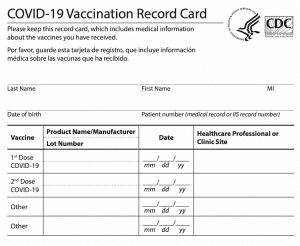A COVID vaccine passport would only show a person’s vaccine status. It would not reveal any other health information. Would revealing that actually deny anyone their liberty or privacy?

Today’s simple paper, hand-written COVID-19 Record Card offers little security.
The world is in a race to become vaccinated against COVID-19 as quickly as possible. A COVID vaccine passport is now being developed which provides proof of immunization.
In the United States, more than 22 percent of Americans are currently fully vaccinated. Unfortunately, in most countries, the percentage is much lower. Many travelers are rushing to become vaccinated. A COVID vaccine passport may become tantamount to a travel license.
Many nations require vaccination requirements for entry into their countries. It appears that as the vaccine becomes readily available, the COVID vaccine passport permits travelers to skip lengthy quarantine periods. This works for easier entry if they’re vaccinated and may deny entry for unvaccinated travelers.
For countries with COVID-19 vaccination requirements, travelers will need some kind of vaccination proof. Increasingly, the proof might take the form of a digital health pass (DHP) or a COVID vaccine passport. Many venues such as concert halls, museums, sports arenas, and cruise lines are considering using vaccine passports for entry to keep employees and patrons safe.
COVID vaccine passport opponents consider them a violation of their fundamental rights granted in the Constitution.
Opponents of vaccine passports consider them to be a violation of their fundamental rights of liberty and privacy, but is that true? Here in the US many vaccine passport opponents say they are illegal because they reveal a person’s protected health information. Are those claims true?
The EEOC permits businesses to require COVID vaccine passports.

Americans make decisions about their own health every day. However, does anyone have a right to make a decision about another person’s health? Withholding information about a potential exposure to a lethal, highly infectious virus, begs that question.
Let’s examine some critical characteristics of COVID-19.
More than 580,000 Americans have died of COVID-19.
Just over a year since the first case of COVID-19 in the US, more than 32.4 million Americans suffered from this virus. That’s almost the same number of Americans who were infected with influenza in 2019, according to CDC estimates. From those cases of influenza, approximately 34,200 deaths resulted. In the last year, COVID-19 killed more than 580,000 Americans, almost 17 times the number of deaths from influenza. There can be no doubt that COVID-19 is an extremely lethal, highly infectious virus.
COVID-19 presymptomatic infected people are highly contagious.
Studies such as “Analysis of Asymptomatic and Presymptomatic Transmission in SARS-CoV-2 Outbreak” inform us of presymptomatic transmission. This type of COVID-19 is apparently more serious than the symptomatic transmission of the virus. So, many Americans can easily infect others who are close to them, in the same room, business, airport, airplane, cruise ship, etc.
COVID PCR testing of presymptomatic infected people is highly unreliable.
Research such as a study of false-negative rates of PCR testing of COVID-19 (SARS-CoV-2) reveals poor results. Published in the American College of Physicians Annals of Internal Medicine (AIM), results show that during the four days of infection prior to symptoms, tests fail. Typically, the probability of getting a false negative PCR COVID-19 test result ranged from 100 percent on the day after infection to a mean of 67 percent on the fourth day.

Let’s sum up. COVID-19 is an extremely lethal, highly infectious virus. Presymptomatic people infected with COVID-19 are significantly infectious, likely more infectious than when symptoms appear. You can’t reliably test a presymptomatic person infected with COVID-19. Add to that the fact that once a person is fully vaccinated, while it’s not impossible that they will become infected with COVID-19, it’s highly unlikely.
COVID vaccine passports allow us to know others are fully vaccinated
A COVID vaccine passport is the only reliable means for anyone to know if that person is likely safe and not infected with COVID-19. Otherwise, any person makes a decision about the health for everyone else near them. By withholding their vaccination status, they deny liberty to others while demanding it for themselves.
Vaccine passports do not violate anyone’s liberty or privacy. However, banning them or refusing to use them unethically denies others their liberty to stay safe from a dangerous and lethal virus.
READ ALSO:
Travelers United members COVID vaccine passport poll
Travel bans do little
After many years working in corporate America as a chemical engineer, executive and eventually CFO of a multinational manufacturer, Ned founded a tech consulting company and later restarted NSL Photography, his photography business. Before entering the corporate world, Ned worked as a Public Health Engineer for the Philadelphia Department of Public Health. As a well known corporate, travel and wildlife photographer, Ned travels the world writing about travel and photography, as well as running photography workshops, seminars and photowalks. Visit Ned’s Photography Blog and Galleries.



